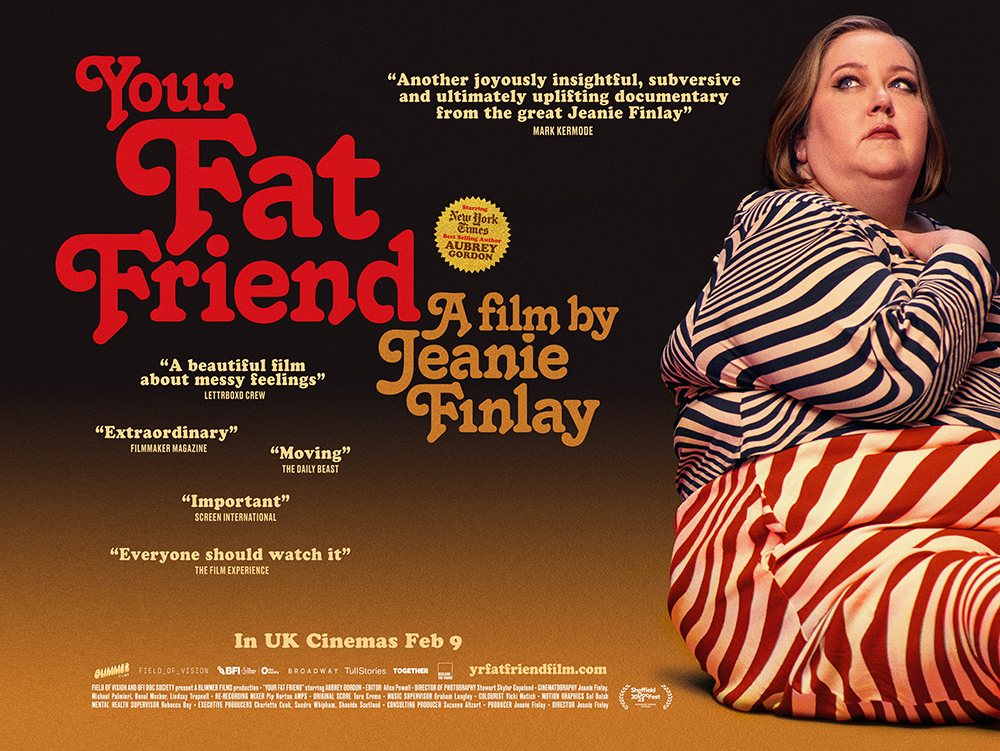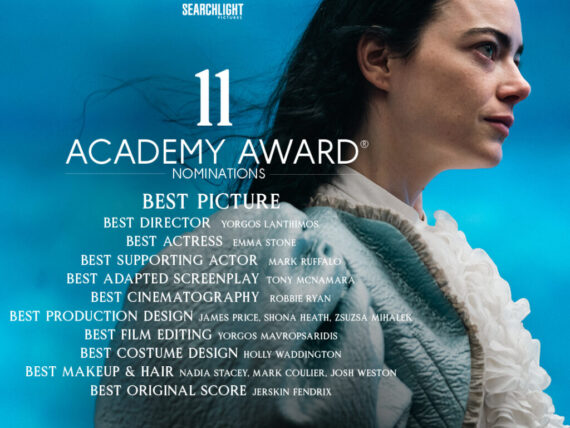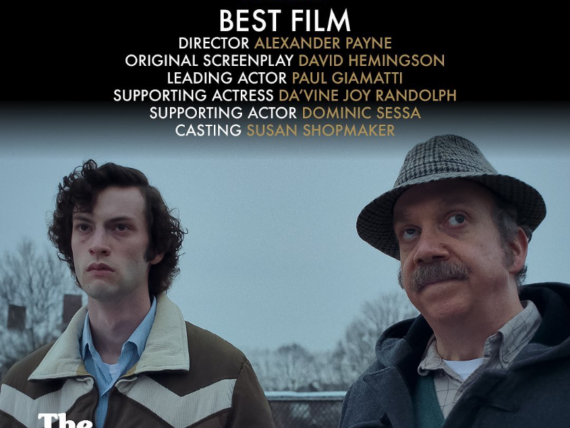YOUR FAT FRIEND
Just say “fat”. As an opening gambit, Jeanie Finlay’s documentary isn’t shy about throwing around the F word. Your Fat Friend doesn’t tiptoe around the issue of fatness, but approaches it unapologetically. A film that documents both individual and collective experience, Your Fat Friend is a fearless exploration (and explanation) of what it’s like living in a world not designed for you.
The film’s focus is author and podcast presenter, Aubrey Gordon. Finlay follows Gordon over a six-year period as she negotiates her way through a publishing deal all the way to a post-pandemic book launch. But Aubrey Gordon’s story starts much earlier. Working as an LGBTQ+ activist, Gordon’s commentary on the politics of anti-fatness gained notoriety when she decided to start a blog, Your Fat Friend. Intended as an open letter to her thin friend, illustrating how their life experiences differed because of their size, Gordon posted the blog anonymously. Eschewing the typical narrative of unexpressed feelings and locating that elusive self-esteem, Gordon got specific. She leaned into how fat people are treated by others and by institutions: think “less empathy, more solidarity”. The blog was read by over 30,000 people in 1 week.
The blog grew in influence (it could count Jameela Jamil and Monica Lewinsky among its fans) and Gordon used her platform to question widely-held beliefs about fatness, in particular, she targeted the “profound bias” often found within the healthcare profession. Using a combination of fly-on-the-wall filming and giving Aubrey her own camera to record her thoughts, Finlay finds in Aubrey the perfect documentary subject. Gordon is engaging and well-versed, providing a crash course on the inequalities faced by fat people on a daily basis. Besides the social and economic barriers, Gordon voices her ambiguity towards medicine, with both diagnosis and access an issue for fat people. With every consultation ending in a lecture on weight loss, Gordon ended up refusing to see her doctor for 8 years.
In speaking to an audience potentially unaware of the difficulties growing up in a fat body, Finlay uses the metaphor of swimming to explain the impact of fat bias. A competitive swimmer in her childhood, Gordon equates anti-fatness as “the water we all swim in, everyday”. Pervasive and unavoidable. Finlay’s shots of Gordon in the water as an adult, are gloriously sensuous and, in themselves, a bold political act, as Finlay challenges us to look at the fat body in a different way.
But as Aubrey’s blog confronted the logic of weight loss, Gordon found that old ideas have a habit of persisting. Despite the ineffectiveness of diets to produce weight loss in the long term, “calories in, calories out” is still (incorrectly) perceived as a truism. We see Gordon joining forces with journalist Michael Hobbes to start the Maintenance Phase podcast. The format is simple but effective: the duo spoof ridiculous diets and fads, dismantling perceived notions and countering them with scientific data. (Gordon’s collection of vintage diet books that she shows to Finlay will be familiar to her podcast fanbase.)
But Gordon’s success also attracts unwanted attention from the corners of the internet where new ideas are not warmly welcomed. Finlay, in a shocking scene, reveals some of the online abuse Gordon has received. They range from attempts to dehumanise her to actual death threats. As Gordon secures a book deal, she realises that her anonymity as Your Fat Friend will have to come to an end. She becomes more visible and more vulnerable.
Finlay wisely takes a step back, letting Aubrey tell her own story. Your Fat Friend is steered by Gordon’s irresistible personality: she charms the viewer from the start. This will be, for many people watching, a first. A fat person, at the centre of the action, and while she has your attention, Aubrey makes good use of it. Her truth bombs are dropped gently but decisively. Throughout the documentary, Gordon mentions facts, each one more surprising than the last. This is what Gordon does best, and the film is the perfect vehicle for it. Consider the following: you can only be classed as having an eating disorder if you’re under a certain BMI; the “wellness” industry (which includes Weight Watchers) is worth $5.6 trillion dollars and no country has ever reduced its obesity rate, despite decades of public policy and alarmist media headlines. Finlay’s examination of the Gordon family dynamic uncovers not one but several generations of disordered thinking and behaviour around food. It is not a cause, but a symptom. That is the final truth bomb. There is no quick fix, no easy remedy. Fat activism steers us towards acceptance, because that’s all that’s left.
Finlay’s frank, empathetic film will be a series of revelations to some, and confirmation of lived experience to others. Your Fat Friend starts off by looking at marginalised lives, but through Gordon’s charismatic presence, we also find commonalities. A documentary that’s done its homework, in Your Fat Friend Gordon and Finlay bring us a step closer to understanding this complex and emotive subject.
Your Fat Friend is screening at Plymouth Arts Cinema from Friday 1st – Thursday 7th March. The screening on Thursday 7 March will be introduced by Robyn Lawrence, from Reclaim The Frame.
Reviewed by Helen Tope









Comments
No comment yet.